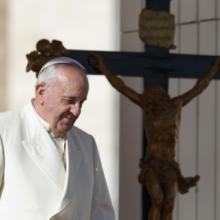Catholic conservatives
For much of its long history in the U.S., the Catholic Church was known as the champion of the working class, a community of immigrants whose leaders were steadfast in support of organized labor and economic justice – a faith-based agenda that helped provide a path to success for its largely working-class flock.
In recent decades, as those ethnic European Catholics assimilated and grew wealthier, and as the concerns of the American hierarchy shifted to battles over moral issues, such as abortion and gay marriage, traditional pocketbook issues took a back seat.
More than 100 Roman Catholic leaders are using this week’s annual march against legal abortion to press anti-abortion House members to pass immigration reform, saying they should see it as another “pro-life” issue.
“As brothers and sisters in faith, we urge these elected officials and all Catholics to defend the sanctity of human lives at all stages. We recognize the image of God in the migrant at the border, in the prisoner on death row, in the pregnant woman and in the hungry child,” the signers say in a letter sent Jan. 21 to two dozen Catholic members of the House of Representatives who are vocal abortion opponents.
The letter, organized by the Washington-based progressive advocacy group Faith in Public Life, is expected to be published as a full-page ad in Politico on Jan. 22.
That’s the day tens of thousands of demonstrators — including some of the House members the statement addresses — are expected to gather in Washington to protest the 1973 Supreme Court decision that legalized abortion, an annual display of passionate anti-abortion sentiment and political muscle.
The statement pointedly cites Pope Francis’ views that immigration woes and economic inequality are threats to life along with abortion, and it appears to be another example of the so-called Francis effect that is recasting the nation’s culture war by shifting the debates onto a broader terrain.
Catholic environmental groups from around the world on Jan. 14 announced a new global network to battle climate change just as many Catholic conservatives are sharply criticizing Pope Francis’ campaign to put environmental protection high on the church’s agenda.
“We are certain that anthropogenic (human-made) climate change endangers God’s creation and us all, particularly the poor, whose voices have already spoken of the impacts of an altered climate,” the new Global Catholic Climate Movement says in its mission statement.
“Climate change is about our responsibility as God’s children and people of faith to care for human life, especially future generations, by caring for all of God’s wondrous creation,” the statement continues.
The GCCM said it intends to push for international treaties to battle global warming but said it is approaching the issue from a moral and biblical perspective and hopes to “encourage the conversion of hardened hearts.”
That could be a tall order in light of current arguments over climate change in U.S. politics and in the American church.
Pope Francis has been working nonstop since his election more than a year ago, and he has shown remarkable resilience for a 77-year-old confronted with an array of church crises. But he is also fatigued at times and his advisers are hoping that he will take a break this summer.
“We have been asking him to have holidays this year,” Cardinal Oscar Rodriguez Maradiaga of Honduras told reporters during a visit to Washington this week. “Because last year he didn’t and sometimes he’s very tired.”
“So I think that during August he’s going to retire to rest,” said Maradiaga, who heads a kitchen cabinet of eight cardinals from around the world that Francis established as his top advisers.



